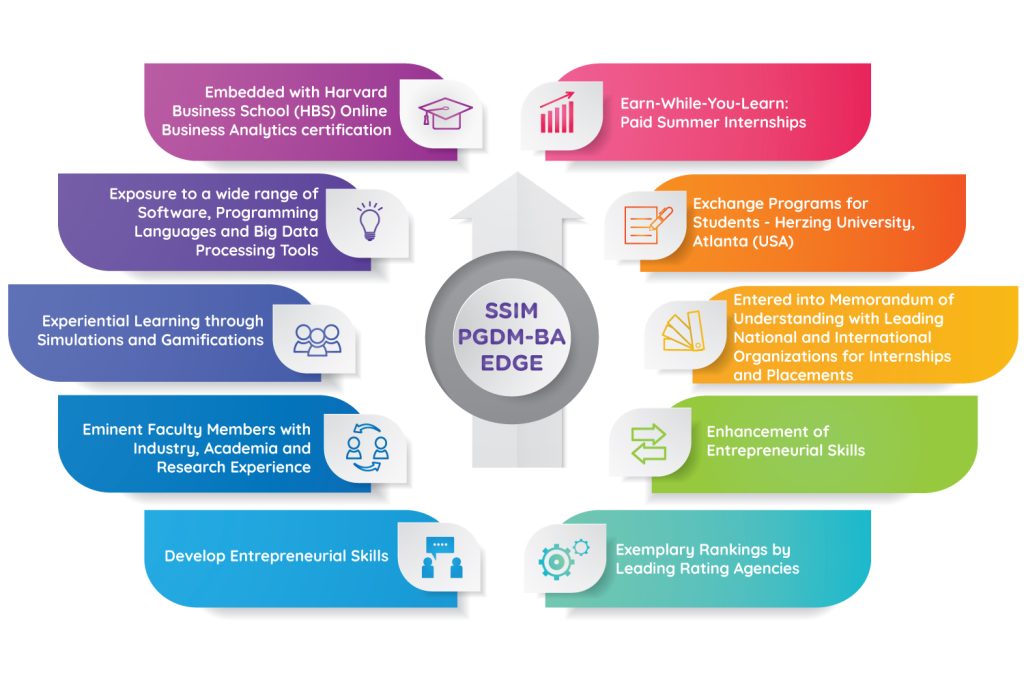PGDM Business Analytics
One of the best available estimates suggest that 2.5 quintillion (2.5 followed by 18 zeros) data is generated every day. Business organizations, both small and large, are moving from opinion based, intuition based and experienced based decisions to data-driven decisions. Firms use analytics to solve wide range of problems starting from simple process improvement to complex decision-making. Most of the products or services available today are driven by analytics.
However, the labour market data shows shortage of data analytics professionals and the demand for them likely to go upto 25 percent between 2020-2030. To address this shortage SSIM started a two-year full-time PGDM program in Business Analytics. SSIM exemplifies the foresight in uniting Business management, Analytical mathematics, Statistics and Computer science under one course i.e. PGDM Business Analytics. SSIM is the first institute, among the Telugu speaking states, to offer a PGDM program exclusively on Business Analytics.
UNIQUE COURSE
PGDM Business Analytics at SSIM is a unique course blended with business acumen, statistics and technology. This program is will be a best-fit for students who are willing to build their careers in the area of analytics. This course focuses on functional domains of management and its application in different industry sectors.
Students will be focusing on Marketing analytics, Financial analytics, HR analytics, Operational analytics etc., This course will also build strong foundations for emerging fields of data science like Artificial intelligence, Neural networks, Advanced Machine learning, Big data analytics and Cloud computing techniques.
This program is designed to achieve the following specific objectives:
- To gain understanding of how managers use business analytics to formulate and solve business problems and to support managerial decision making.
- To apply principles and skills of economics, marketing, and decision making to contexts and environments in data science.
- To build and enhance business intelligence capabilities by adopting the appropriate technology and software solutions.
- To provide students with leading-edge analytical skills in various functional areas of business.


SSIM PGDM-BA EDGE
- Embedded with Harvard Business School Online Business Analytics certification
- Exposure to wide range of software, programming languages and big data processing tools
- Experiential learning through simulations and gamifications
- Eminent faculty members with industry, academia and research experience
- Earn-while-you-learn: Paid summer internships
- Exchange programs for students - Herzing University, Atlanta (USA)
- Entered in to Memorandum of Understanding with leading national and international organizations for internships and placements
- Enhancement of entrepreneurial skills
- Exemplary rankings by leading rating agencies
Unparalleled Faculty
Full time faculty with exceptional industry experience
and research aptitude facilitate extraordinary learning experiences.
Visiting faculty from corporates share perspectives
that enlightens your intelligence and emboldens your confidence.
Experiential Learning
Experiential Learning process is portrayed as an idealized learning cycle or spiral where the learner “touches all the bases”—experiencing, reflecting, thinking, and acting. The process of learning from experience is ubiquitous, present in human activity everywhere all the time. The holistic nature of the learning process means that it operates at all levels of human society from the individual, to the group, to organizations and to society as a whole.
Students are expected to learn basic aspects of business and industry, operational aspects related to formalities and documents required to start a business, understanding of business and its model, structure of the firm/company, products/services, customers, and competitors, challenges faced by the entrepreneur, marketing aspects, production aspects, and finance aspects etc. Students carry out various experiential learning activities: Corporate interview, Industrial Visit, NGO Visit, Simulations, and various other activities which cement their learnings.
Experiential Learnings @ SSIM
Engaging Students
To improve learning in higher education, the primary focus should be on engaging students in a process that best enhances their learning – a process that includes feedback on the effectiveness of their learning efforts.
Connect Theory with Practice
Experiential Learning basically makes connections between academic theory and real-world practice. Experiential learning exposes students directly to the business activities. It reflects a dual focus on practice
Learning by Doing
As part of learning the students learn concepts and do case studies and class exercises. In addition, our students enroll themselves into various student clubs of their choice & learn several management skills practically by organising several events.

